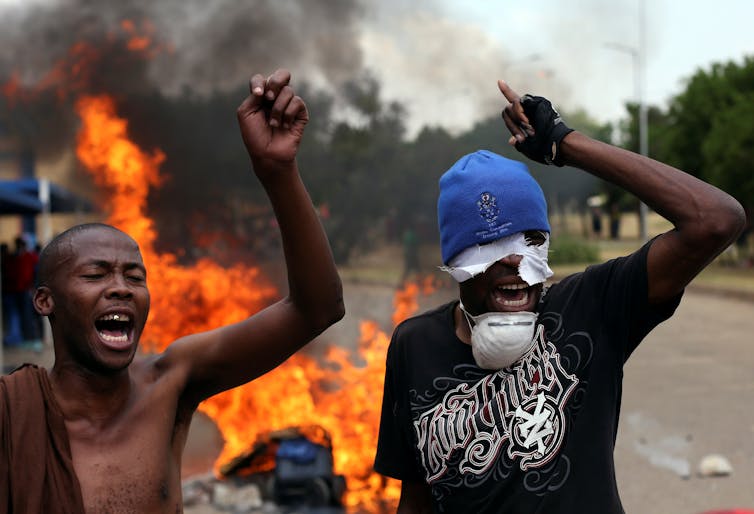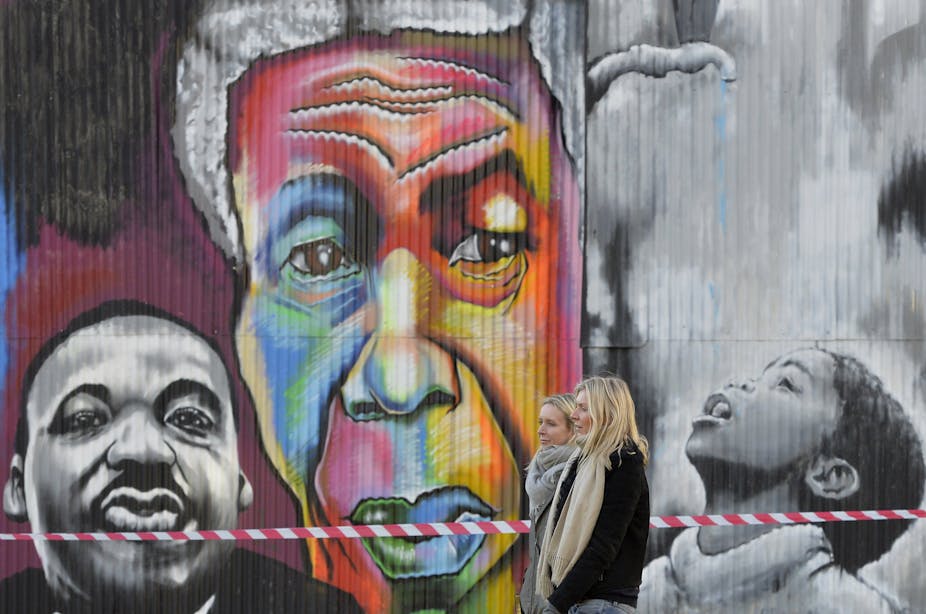South Africa is reaping the bitter fruits of violence: both apartheid’s and the African National Congress’s armed struggle.
At his 1964 trial for treason Nelson Mandela set out the basis for the African National Congress’s (ANC) decision to use violence to fight the violence of apartheid. At one stage he stated:
This conclusion, My Lord, was not easily arrived at. It was when … all channels of peaceful protest had been barred to us, that the decision was made to embark on violent forms of struggle.
At round about the same time across the Atlantic Ocean in the US, Martin Luther King wrote:
It would be both cowardly and immoral for you patiently to accept injustice…. But as you continue your righteous protest … be sure that the means you employ are as pure as the end you seek. Never succumb to the temptation of becoming bitter. As you press on for justice, be sure to move with dignity and discipline, using love as your chief weapon. Let no man pull you so low that you hate him. Always avoid violence. If you sow the seeds of violence in your struggle, unborn generations will reap the whirlwind of social disintegration.
South Africa’s university campuses are burning as students protest, demanding “free, decolonised education”. Those students using violence, inter alia, argue that justice demands the use of such violence and that in effect it is a form of self defence.
Should they heed Mandela, or King?
A violent society
There is an all pervasive presence of violence and contempt for human life in South Africa. Nothing illustrates this more graphically than abortion statistics and the rape of children.
Extrapolating from King’s words, it would be difficult not to conclude that the ANC’s prescription for fighting apartheid was shortsighted. It also did not grasp King’s insights about the inevitability of reaping what one sows when opting for violence.
Crucial to King’s thinking was that violence has a life of its own. The ANC, for its part, believed that the consequences of the decision to use violence could be controlled and managed.
Even more fundamentally, the ANC failed to grasp or understand the full consequences of justifying the use of violence to achieve a “noble” end. One consequence of this is that it provided the generations that followed the justification to use whatever means necessary to achieve their “just” ends.
In the 1980s I was often a defence advocate in “necklace” murder trials. Necklacing involved forcing a tyre over the shoulders of a person accused of collaborating with the apartheid government. The tyre, doused in petrol, would then be set alight. Necklacing as a means to cast off oppression was, to paraphrase King, “the end in the making”.
Feeding the tyrant
The point King makes is that once one opts for violence as a strategy to fight injustice, the devastating consequences will prevail for a long time afterwards.
His point was that meeting violence with violence only serves to feed the tyrant. To apply King’s challenge to South Africa, the aim should have been to starve the violence of the twin tyrant of the Nationalist Party (the party of apartheid) and white capital through militant non-violent civil disobedience.
Even when the ANC was unbanned in 1990 it refused to abandon the “armed struggle” until it achieved its ends, as Anthea Jeffery writes in her book People’s War (page 462). In this way it continued to feed the tyrant of violence which diminished the value and dignity of all human life.
Thousands of people were murdered between 1990 and 1994, many by the forces of the Nationalist Party, but many also by a brutal fight for power leading up to the 1994 elections between inter alia the ANC, IFP, Pan Africanist Congress and Azanian People’s Organisation.
And then in 1994 there was an attempt to preach reconciliation, love, tolerance and nonviolence. But, by then, morally speaking, the nation had been grievously damaged. It had been dehumanised by apartheid, and the use of violence to fight it. It had been established on the hatred central to the use of violence.
The evil of apartheid combined with the ANC’s decision to fight violence with violence, and to use violence in its own internal conflicts, was a toxic cocktail. The results are still with us today.

This is evident in the violent turn the student protests have taken. A student recently stated on national television that the only option open for the protesters was to use violence, or to threaten the use of violence, until their demands were met.
Taking the high road
King’s aim was to shame the racists, to stir their consciences. Fundamental to this was the belief that hatred and violence should be met with militant non- violent action. Crucially, this also meant being prepared to take the full consequences of such action. These consequences included imprisonment, beatings and even death.
If South African students were to embrace King, I have no doubt that those with economic power would be shamed and their consciences stirred. The overwhelming majority of ordinary South Africans also would come out in open support for the just cause of making tertiary education accessible to the poor and powerless.
South Africa’s students could make a significant contribution to the nation’s moral regeneration if they disavowed violence and took the high road espoused by King.
As a nation we are still reaping the fruits of the violence of apartheid and the use of violence to fight it. South Africa’s students can help the country break that cycle. And is it not central to the call of university students to say no to the status quo, in this case the use of violence, and to provide a new and better way?
A concluding thought by King is also cause for further reflection:
It (the nonviolent approach) does something to the hearts and souls of those committed to it. It gives them new self-respect.

